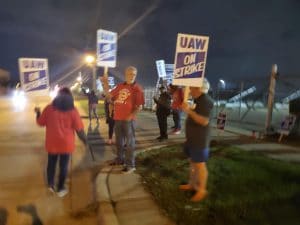General Motors Co. and the United Auto Workers continued to struggle with key issues with view visible signs of progress.
GM did back away from an earlier decision to cancel the health insurance of the more than 48,000 striking union members but the union didn’t exactly take it as a goodwill gesture.
Instead the UAW re-iterated GM had failed to notify the union of the cancellation and only shifted course after local news reports showed union members or the children and spouses being denied critical coverage.
(GM, UAW Make Some Progress, But Big Issues Remain Unresolved)
“GM is very concerned about the significant confusion caused around our employee’s health care coverage. Throughout this negotiation, GM has said that our number one focus was on the well-being of our employees. That remains the case today,” GM said in a statement.
“Given this confusion, GM has chosen to work with our providers to keep all benefits fully in place for striking hourly employees, so they have no disruption to their medical care, including vision, prescription and dental coverage,” GM’s statement added.
GM also said if employees have an insurance claim, they should submit it. GM will continue to provide them the coverage they rely on given the circumstances.
GM’s decision brought a curt reply from Terry Dittes, the head of UAW’s GM Department, who is responsible for the negotiations with GM that indicated the union did not view the company’s action as conciliatory.
“Finally, a week after terminating benefits, you write me a letter dated Wednesday, September 25, 2019, and received on Thursday, September 26, 2019, stating, ‘GM has chosen to work with our providers to keep all benefits fully in place for striking hourly employees.’
“These irresponsible actions by General Motors are toying with the lives of hundreds of thousands of our UAW families.
“There is no doubt that public sentiment sees these actions of GM as a shameful act,” Dittes said in a letter sent to GM’s top negotiator on Sept. 26.
“Finally, it is time for GM to come to the bargaining table with an offer that reflects the hard work of our Members who make you successful and will settle this strike on behalf of the hundreds of thousands of UAW families, and stop toying with our families’ health and well-being,” Dittes said.
(Union Strike Spills Over into Mexico, GM Fires Silao Protestors)
“It’s outrageous that they used health care as leverage over striking workers, but now that their brand takes a hit they restore it,” added a union source close to the negotiations, who is not allowed to comment publicly.
Both sides, however, said the discussion are continuing.
GM officials, however, said the company is looking for a way to shore up its competitive position, which is being undercut because its labor costs are still the highest in the North American industry.
Citing a study from the Center for Automotive Research in Ann Arbor, Michigan, GM officials noted its all-in manufacturing costs per hour are $63 compared to $50 at the international/non-union manufacturers, which are able to use more temporary workers.
In addition, GM insists a more flexible staffing model provides many benefits to traditional hourly workers and the company. For workers, given their generous vacation benefits it helps them take their scheduled time off.
It also helps them with any unscheduled absences. For the company, workforce flexibility helps with absenteeism, addressing the many different types of work done in a plant, marketplace fluctuations, product launches, GM officials said.
The union, however, has pushed back hard and even before the strike the UAW’s secondary leadership, which is made up of local union president and committeemen, were saying they expected the negotiations to address the issues.
Union officials insist keeping workers as the equivalent of full-time, permanent employees at a lower wage rate with fewer benefits ins unfair and undermines morale.
(GM, UAW Exchange Barbs as Strike Costs Mount)
In the last round of negotiations in 2015, many workers blamed the union for the presence of temporary workers and two-tier wages structure. This time around the focus of the frustration has shifted from the union to policy and practices not only of GM but also at Ford Motor Co. and Fiat Chrysler Automobiles N.V.


In a sign of good will, GM agreed to continue paying striking workers, including overtime if they spend over 8 hours picketing. Sunday, of course, will be double time as will the upcoming Thanksgiving holiday. Shuttle service will be provided between the plant gates and parking lots.